|
|
I noticed best of 2012 posts going up at least a couple of weeks ago, but I always like to give the books I read at the very tail end of the year a chance. My list is also a top 10 just for me, from books that I read in 2012, not books that were published in 2012. With any luck, I might even have reviewed most of these!
In no particular order:
 The Song of Achilles, Madeline Miller The Song of Achilles, Madeline Miller
This book was such a poetic, moving portrayal of the love between two people who happened to both be men. Tying it together with one of the world’s oldest stories made it an incredible read.
Girl Reading, Katie Ward
I loved this interpretation of girls reading throughout history; each vignette, based on a portrait, was well written and gave a snapshot of women’s lives throughout history. It’s striking how things are different and yet so much the same. I really loved this one.
Chime, Franny Billingsley
Chime was a book I wanted to reread as soon as I reached the last page. It had every element that I love in a fantasy novel, and then some. It’s a shame the cover actually kept me away for as long as it did.
 Miss Pettigrew Lives for a Day, Winifred Watson Miss Pettigrew Lives for a Day, Winifred Watson
My first Persephone classic ends up on this list – I simply adored this book and the way that Miss Pettigrew found herself and her independence in the space of a day.
Imagined Lives: Portraits of Unknown People
This compilation by multiple different authors of fiction takes portraits featuring those whose identities have been lost from the National Portrait Gallery and imagines what their lives might have been like. Combining history with humanity and focusing on the people, this was a surprisingly good and touching read that was connected to history in a way I loved.
Among Others, Jo Walton
There aren’t many words to describe how much I loved this book. A young girl’s coming of age steeped in books and loneliness and loss, but a magical read nonetheless. If you like science fiction and fantasy, it’s so worth your time.
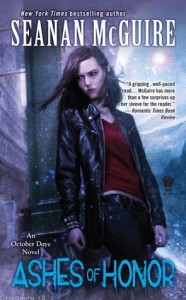 Ashes of Honor, Seanan McGuire Ashes of Honor, Seanan McGuire
The October Daye series is probably my favorite urban fantasy out there, and this latest book was simply the best. I loved it to pieces, just like I love the rest of the series.
Feed, Mira Grant
And, a rare appearance by the same author, this book, the best of the trilogy in my opinion, was a political drama, emotional wringer, and zombie-infested thrill ride through the world of the news. I liked the combination of great story with the blogging angle and this particular version of the future, plus the amazing character of Georgia Carolyn Mason.
Code Name Verity, Elizabeth Wein
I doubt I need to say anything else about this book besides read it, now – it’s been on so many other lists and so frequently mentioned this year that my little mention isn’t particularly significant.
The Secret Countess, Eva Ibbotson
Finally, my most recent read on the list, I consumed this book on the train and now cannot wait to read more Eva Ibbotson.
And a couple of honorable mentions for the series that I made progress in this year:
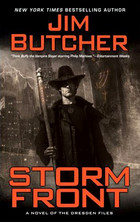 The Dresden Files by Jim Butcher The Dresden Files by Jim Butcher
I inhaled most of these books this year, buying them one by one from the bookstore when I’d finished each. I’ve completely gotten sucked into this series, and having just finished Changes with my jaw almost literally on the floor, I don’t see myself stopping in 2013 until I’ve reached the end of the series. Unfortunately, I’m only two books away from running out of books, so I hope Jim Butcher learns to write faster than I can read soon.
The Downside Ghosts series by Stacia Kane
While I liked the first book in this series, I fell in love – as much as you can love a drug addict who is so bad for herself – with the following three. These books are like emotional gut punches, making me fall in love with characters I never even thought I’d like. Chess Putnam is a train wreck waiting to happen, but she’s a train wreck that I am genuinely concerned for and constantly rooting for, too.
What are your top books of 2012? Feel free to send me a link in the comments, I’d love to take a look!

Happy New Year! 2013 completely snuck up on me; I spent the last week of the year in the United States with my family and wound up taking an impromptu blogging break. I wish you and your families all the best for the New Year!
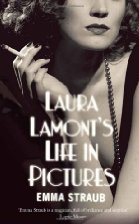 Blonde little Elsa Emerson loves the stage. Born in 1920, she’s just in time for the delight of the silver screen and the glamour of acting. She grows up around and on her father’s stage, playing small roles, and loving and being loved by her two sisters, especially beautiful Hildy. When tragedy strikes her family, Elsa decides that she should live her life on a bigger stage, and when Gordon-from-Florida Pitts comes to her small town in Michigan, Elsa heads straight for Hollywood. There, she’s christened Laura Lamont by the most famous producer in town, transforming from blonde and wholesome country girl to glamorous screen star. Blonde little Elsa Emerson loves the stage. Born in 1920, she’s just in time for the delight of the silver screen and the glamour of acting. She grows up around and on her father’s stage, playing small roles, and loving and being loved by her two sisters, especially beautiful Hildy. When tragedy strikes her family, Elsa decides that she should live her life on a bigger stage, and when Gordon-from-Florida Pitts comes to her small town in Michigan, Elsa heads straight for Hollywood. There, she’s christened Laura Lamont by the most famous producer in town, transforming from blonde and wholesome country girl to glamorous screen star.
The early days of Hollywood have always held a strange fascination for me. Modern celebrities don’t interest me at all, but the first years of films have passed into the realm of history, and the fact that we can still see all of these people on screen today makes their lives all the more interesting. Laura Lamont is, of course, fictional, but she’s been written in such a way that she could have been many famous actresses from our time. Her transformation from “ordinary” girl to superstar is actually quite remarkable; with the change of name, hairstyle, and diet, Elsa becomes Laura in a way that she hadn’t precisely anticipated, and the consequences of that are profound.
What I most liked about this, I think, was the way that Laura’s life was so far from perfect. The contrast between her public and her private lives was absolutely immense. Even when she grows older, the reaction that she gets from people who loved her old films is notable compared to her actual life outside them; it shows how little we really know about celebrities when they keep their personal lives quiet, and how eternal they seem to us when, in reality, they are flawed and age just as the rest of us do. We don’t really spend all that much time experiencing a “glamorous” lifestyle through Laura’s eyes; the book really focuses on her actual life behind the screen and her family, both at home in Michigan and in Hollywood.
Straub is naturally influenced by what happened in real-life Hollywood; I’ve even seen various guesses of who Laura herself is inspired by. Some of her silver screen friends are somewhat obvious, but I didn’t spend much time trying to pin who was inspired by who. For those who know more about Hollywood history than I do, there is undoubtedly quite a bit to spot here in terms of influences, but it’s not critical to liking the book, at least it wasn’t for me.
A thoroughly enjoyable read, although sometimes unsettling thanks to the ups and downs of Elsa / Laura’s life, Laura Lamont’s Life in Pictures is a good choice for anyone who enjoys thinking about the early days of Hollywood or is at all interested in the lives of celebrities behind the scenes.
I received this book for free for review.
 Translating, often assumed to be a fairly standard process, is in reality anything but. Text is one language is not directly transferable to another language. Just try translating an idiom from one language to another; finding a needle in a haystack or having your mouth water is not something that can be directly translated. And what is translation, anyway? To what extent do you change the text to make it fit in, and to what extent do you change it further to give a text an “atmosphere”? In this book, David Bellos, a translator himself, deconstructs the process and examines why we do what we do when we convert something from one language into another. Translating, often assumed to be a fairly standard process, is in reality anything but. Text is one language is not directly transferable to another language. Just try translating an idiom from one language to another; finding a needle in a haystack or having your mouth water is not something that can be directly translated. And what is translation, anyway? To what extent do you change the text to make it fit in, and to what extent do you change it further to give a text an “atmosphere”? In this book, David Bellos, a translator himself, deconstructs the process and examines why we do what we do when we convert something from one language into another.
My interest in this particular topic has been prompted by the fact that the company I work for in real life specializes in multilingual and multinational search. We have a translation agency in our company, and I’ve personally been involved in many projects where translation is involved and is really important to the project in question. Plus, with such an international workforce, it’s fun to get into debates about how different languages are and how it’s much more difficult to translate between some than others. We always focus on local and local knowledge as much as we possibly can, but there has to be the ability to translate somewhere, and that’s why I was quite curious about the actual process – plus, an ongoing interest in linguistics that I’ve abandoned since university is always a factor.
That said, I’d expected something a lot lighter than this book actually was. Bellos is an academic and his book reads like one that was written by an academic. Some parts are fascinating and full of facts, while others are a bit dry. He has one particular chapter that’s about meaning and how it’s expressed, which isn’t a light read for anyone. It’s all fascinating, in my view at least, but it took me longer and more brain power to get through than your average non-fiction read.
I did feel as I was reading that I was really learning something, though; I don’t speak anything but English fluently, so a lot of the book was new to me since I don’t know what goes through a translator’s head. I loved particular little tidbits which really made me feel I was genuinely learning, such as:
For the ancient Greeks, the sound of the foreign was the unarticulated, open-mouthed blabber of va-va-va-, which is why they called all non-Greek-speakers varvaros, that is to say, barbarians, “blah-blah-ers”.
I already knew about what he says directly after – that the Russian word for German means, basically, deaf – but that about the origin of the word “barbarian” just made me smile.
Bellos wraps up the book with more thoughts on meaning, and how we can express meaning without language at all. It’s a thoughtful look back at the whole book and the way people actually understand each other. I really liked Is That a Fish in Your Ear?, but I don’t think it’s for everyone; if you do enjoy languages and translation, though, it’s certainly a book that you should try.
I purchased this book.
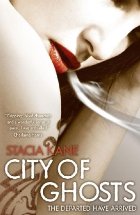 Chess Putnam is a wreck in almost any way she can think of. She’s driven away her closest friend by sleeping with another man and she’s a drug addict that can barely function without a few pills. The only positive thing in her life, really, is her job as a Church witch and her faith in the Church’s ability to debunk ghosts. Even that faith is about to be thrown into question, though, as Chess begins working with a girl called Lauren, the daughter of the Grand Elder, a Church cop. Chess feels that there is something wrong about Lauren; her spells are wrong, her magic is wrong, but with the promise of a hefty check in the bank and little reason to pursue other paths in life, she goes along with it, only to find that the Church is not nearly so powerful as she’d thought. Chess Putnam is a wreck in almost any way she can think of. She’s driven away her closest friend by sleeping with another man and she’s a drug addict that can barely function without a few pills. The only positive thing in her life, really, is her job as a Church witch and her faith in the Church’s ability to debunk ghosts. Even that faith is about to be thrown into question, though, as Chess begins working with a girl called Lauren, the daughter of the Grand Elder, a Church cop. Chess feels that there is something wrong about Lauren; her spells are wrong, her magic is wrong, but with the promise of a hefty check in the bank and little reason to pursue other paths in life, she goes along with it, only to find that the Church is not nearly so powerful as she’d thought.
I’ve more or less stopped reviewing most of the urban fantasy that I read on my blog because I tend to read books in a series very often and very quickly, and once I get to the middle of a series, it gets harder to keep track of spoilers and find something unique to say about each installment. But everyone, I loved this book in a way that makes me want to write about it, so here I go giving it a try once again. I don’t love it in the way that I love, say, The Remains of the Day or Among Others, but this was such an incredible, addictive, heart-pounding read that it satisfied every little desire I had for an urban fantasy book.
I really like the darkness that this series brings along with it. Chess’s city, especially Downside, is not a nice place to live. It reminds me of a Gotham city, except even more corrupt; the people she cares about are all generally drug pushers or addicts, except for those in the church, and her own life is an example of how a person gets so addicted to drugs that they can rarely care about anything else. But Chess does care about something else, and that something else is actually a person called Terrible. You see, in the last two books, we’ve been watching the relationship between Chess and Terrible develop, in a heart-melting, exciting way, until he saw something that turned him away from her completely.
The agony that’s resulted from this for Chess is incredibly intense – it took losing him to realize how much she really cared about him, and watching their relationship move on from this was honestly so emotional that I couldn’t believe I was feeling quite that much about these two people who are so incredibly broken. Terrible is a guy that scares the people of Downside as Bump’s chief enforcer; he is the guy who forces money out of people if they don’t pay up for their drugs. He’s so far from the charming rogues that grace some of my favorite historical romance novels that I doubt he’d recognize a suit if he saw one. But based on these books, I completely fell in love with his character, and with Chess and him together. Yes, she screwed up, but this relationship is simply addiction of the strongest kind. For them, and for me, the reader.
The story itself is good too, of course; the mystery around what’s happening with Lauren and Chess’s investigation is well worth following. But as always for me with a series, it’s the relationships that characters build that keep me going, and this series has completely, already, hooked me in. Very, very highly recommended.
I purchased this book.
 Miles Vorkosigan, one of the Barrayaran Emperor’s right-hand men, has been sent to investigate rumors of bribery and corruption on a world which focuses heavily on the cryogenics industry before those industries get involved on Barrayar. On Kibou-daini, almost everyone gets frozen either before or very immediately after their deaths, which has led to a huge bureaucracy built up around the industries that supply this freezing technology. Miles, a man whose life was saved by cryo technology, isn’t going to fault them for wanting to avoid death, but what he does find is a cold, corrupt industry that fails to look after those who have entrusted their lives to the future. Miles Vorkosigan, one of the Barrayaran Emperor’s right-hand men, has been sent to investigate rumors of bribery and corruption on a world which focuses heavily on the cryogenics industry before those industries get involved on Barrayar. On Kibou-daini, almost everyone gets frozen either before or very immediately after their deaths, which has led to a huge bureaucracy built up around the industries that supply this freezing technology. Miles, a man whose life was saved by cryo technology, isn’t going to fault them for wanting to avoid death, but what he does find is a cold, corrupt industry that fails to look after those who have entrusted their lives to the future.
Like many others have said before me, Cryoburn isn’t really a novel that stands up the same as the other Vorkosigan novels do. While Miles is still the main character, he is no longer growing and changing; he’s the same disarmingly clever and ingenuous man as always, but he’s now completely matured and committed to the world as he knows it. Not many of the series’s other recurring characters appear in this book; Ekaterin features in just one scene and we don’t even get to visit Miles’s children. The only one with Miles is Armsman Roic, although a few familiar faces appear in the latter half of the book. The stakes aren’t quite as high here either; sure, things are messed up on Kibou-daini and for many of the people Miles meets, but he himself is out of danger and off investigating fairly quickly.
For what it was, though, I quite enjoyed it. I liked meeting the side characters and seeing Miles through a different set of eyes yet again, especially those of the children. Jin with his menagerie was a charming character, although I didn’t really understand why he was so adamant about running away from his aunt, especially if she let him keep his animals outside. Even the other Barrayarans on the planet with Miles were entertaining, and I liked what Bujold did with those stories too. It was a book that I enjoyed reading, but it wasn’t a book that would have made me fall in love with the series as I have over the past year and a half.
That said, then the ending happened, and I had to pick my jaw up off the floor. I know the next book in the series features Ivan, not Miles, but seriously, after that? I had to take a break from reading to recover for a while. It totally wouldn’t have worked if I hadn’t had the accumulated feelings from the entire series, I think; each of the little snippets was heart-breaking in its own way. Another reminder that this is a series which belongs all together, and it’s not worth reading from it without starting at the beginning.
As with all the Vorkosigan books, this series is highly recommended. Start with Cordelia’s Honor or Young Miles!
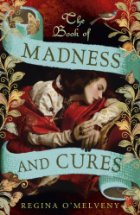 Dottoressa Gabriella Mondini’s father left ten years ago in search of more exotic cures for his book of medicine. Since then, Gabriella, who he trained as a doctor himself, has seen to her round of patients and rattled around in her house with only her mother for company. Her father’s letters have become increasingly vague, without locations, and she’s begun to worry that he’ll never return. When she’s informed that she is no longer allowed to practice medicine in her home city of Venice, Gabriella feels her ties to her home fall away, and sets off on a journey in search of her lost father and the secrets he’d discovered. Dottoressa Gabriella Mondini’s father left ten years ago in search of more exotic cures for his book of medicine. Since then, Gabriella, who he trained as a doctor himself, has seen to her round of patients and rattled around in her house with only her mother for company. Her father’s letters have become increasingly vague, without locations, and she’s begun to worry that he’ll never return. When she’s informed that she is no longer allowed to practice medicine in her home city of Venice, Gabriella feels her ties to her home fall away, and sets off on a journey in search of her lost father and the secrets he’d discovered.
From the very start of this book, Gabriella is in opposition against everyone around her, and she spends quite a large portion of the book fighting against expectations or, when she’s not able to safely, hiding from those who would do her harm. She spends parts of the book dressed as a boy, or pretending she isn’t actually a doctor, but mostly she is proud of and enjoys her calling, so she shares it with those around her.
This does, however, make for a book that feels kind of exhausting as you’re reading it. Gabriella’s journey takes her from Venice up to Edinburgh and down to Northern Africa; it feels as though she travels forever and that things never get easier. And, every time I thought they just might, she decides to keep moving on and ignore the fact that happiness might be around the corner. I could understand that she hadn’t found her father yet, but she sacrifices a considerable amount in the pursuit of him.
It’s because her search isn’t really about finding her father; it’s about finding who she actually is on her own, without him. Just being a doctor in her native Venice isn’t enough, not when she’s just resting on her father’s laurels, and she somehow believes that in finding him, she’ll settle a part of her heart that’s been lost since he left. It’s a very readable journey, but in all honesty, I did actually find it exhausting and frustrating as she turns down several opportunities to find that something.
Otherwise, I enjoyed this book; it portrays a huge swathe of Europe through a foreigner’s eyes. It’s a relatively easy read, yet remains heartfelt throughout the novel as Gabriella sorts through all of her feelings about the world around her and the people who inhabit that world.
The Book of Madness and Cures is a solid read, though not without its flaws; I’d probably only recommend it to someone else who already enjoys historical fiction or a book about a woman who seeks to discover herself.
All external book links are affiliate links. I received this book for free from the publisher.
 It’s well and truly winter now in my particular corner of the world; we’ve had a few frosty mornings and surely it won’t be long before the first flurries fall. We’ve actually had part of a sunny week after what has felt like a year of rain in York. We’re still recovering from the latest flood, actually. I think the river has flooded four times, at least, to the extent that it’s impossible to walk alongside it into town. I’ve never been so happy to live far enough away that we’re not particularly affected. It’s well and truly winter now in my particular corner of the world; we’ve had a few frosty mornings and surely it won’t be long before the first flurries fall. We’ve actually had part of a sunny week after what has felt like a year of rain in York. We’re still recovering from the latest flood, actually. I think the river has flooded four times, at least, to the extent that it’s impossible to walk alongside it into town. I’ve never been so happy to live far enough away that we’re not particularly affected.
November has been a slow, slow month for me on the reading front. I only read two books in the first ten days of the month, and then two more in the second ten days. It’s not been the slowest month of the year, that was February, but it was going to be for a while there.
I’ve come to terms with the fact that this has been my slowest reading year since I started blogging, though. I’m only predicted to finish 134 books, and my standing goal since I started has been 200. Last year I managed 197. Close enough, I think. According to my spreadsheet, I started falling behind in February, and I never caught up, not even once. I somehow doubt this trend is going to reverse in 2013, but we’ll see!
So, what did I read in November?
Fiction
- Pandora’s Star, Peter F. Hamilton
- The Stockholm Octavo, Karen Engelmann
- The Girl Who Circumnavigated Fairyland in a Ship of Her Own Making, Cathrynne M. Valente
- The Book of Madness and Cures, Regina O’Melveny
- Turn Coat, Jim Butcher
Non-fiction
- The Magnificent Medills, Megan McKinney
- Winter King, Thomas Penn
- Is That a Fish in Your Ear?, David Bellos
Favorite of the Month
 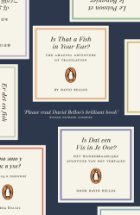
Typically, I haven’t managed to review either of my favorite books of the month yet, but I will in December. I appreciated them both, but for very different reasons.
I want to catch up on everything outstanding this year in December; make sure I’ve either reviewed or decided firmly never to review everything I’ve read in 2012 and start with a clean slate in January. I desperately need one of those. I’m reading the right amount now to actually review at a good pace, if I can only get past all those pesky books I didn’t review in the last few months.
I’d also like to put together my holiday gift guide for 2012, which is the top historical fiction and history books I’d recommend this year. I’ll be doing that next weekend, for those among you who haven’t already thought about what to buy your loved ones!
What’s ahead for you in December?
 Emil Larsson is a Swedish tax inspector of sorts at the close of the 18th century, responsible for ensuring that shipping to and from Stockholm’s port is run properly. A frequent gambler and relatively happy singleton, he is dismayed when his employer demands that he acquire a wife in order to appear more respectable. While waiting to get his own cards read in order to help him find this wife, Larsson discovers that Mrs Sparrow, who runs his favorite gaming house, is actually very close to the Swedish king, and that his own fortune is a small part of the overall scheme taking control of Swedish politics. Emil Larsson is a Swedish tax inspector of sorts at the close of the 18th century, responsible for ensuring that shipping to and from Stockholm’s port is run properly. A frequent gambler and relatively happy singleton, he is dismayed when his employer demands that he acquire a wife in order to appear more respectable. While waiting to get his own cards read in order to help him find this wife, Larsson discovers that Mrs Sparrow, who runs his favorite gaming house, is actually very close to the Swedish king, and that his own fortune is a small part of the overall scheme taking control of Swedish politics.
Those who have read about the French Revolution may recognize that this time period was dramatic for Sweden, too; Count Axel von Fersen, one of Marie Antoinette’s rumored lovers and a key component in their failed escape plan, was Swedish and closely connected to the royal family there. France’s royal family aren’t the only ones in danger, as Sweden’s monarchy is fragile too, with a revolution brewing. Framed through this series of octavos, Emil has to work out the eight influential people around him and understand just how those people influence others in order to help change the fate of the Swedish nation – if he possibly can.
I wasn’t really sure about this book while I was reading it and I’m still not really sure about it as I’m reviewing it. Just looking at it heightens expectations; the British hardcover version of the book is truly beautiful, an elegant hardcover without a dust jacket and with a solid feel to the pages. The story is told through alternating viewpoints and as a result I found it surprisingly difficult to get at all interested in any of the characters, even Emil. He, for one, seems very mercenary and self-serving; once told he has to get married, he just chooses pretty girls without making any real attempt to get to know them or relate to them. I don’t think I’m someone who really needs to fall in love with a character in order to enjoy a book, but I certainly think it would have helped this one.
In addition, it’s a book that starts out slowly and really needs an initial element to help draw readers in. Purported to be a mix of romance, history, intrigue, and card-playing, it sounds more exciting than it actually is. There were some parts I found fascinating; the sections around fan-making and the fan language, for instance, and the little bits of history about the Swedish royal family and the history. The book is well written and very descriptive, bringing this frostier part of the world to life; but I felt while I was reading that there was something missing, a spark that would bring it all together and move this from being a good book into a great one.
A book I’d probably hesitate to recommend to any but a fellow historical fiction reader, The Stockholm Octavo is a decent read but not one that lives up to its promise, for me at least.
I am an Amazon Associate. I received this book for free for review.
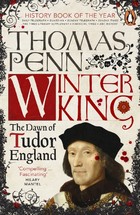 Henry VII, despite being the founding member of the Tudor dynasty, is not actually that well known as a historic figure. His son, granddaughters, and immediate predecessor are all much more prevalent in both fiction and non-fiction, but Henry himself was a significant figure that shouldn’t really be ignored. A bridge between the Plantagenets and the Tudors, Henry changed kingship in England in ways that directly influenced his son, Henry VIII, and shifted the country’s attitude permanently. Henry VII, despite being the founding member of the Tudor dynasty, is not actually that well known as a historic figure. His son, granddaughters, and immediate predecessor are all much more prevalent in both fiction and non-fiction, but Henry himself was a significant figure that shouldn’t really be ignored. A bridge between the Plantagenets and the Tudors, Henry changed kingship in England in ways that directly influenced his son, Henry VIII, and shifted the country’s attitude permanently.
This book has won accolades from numerous publications; my copy has an extensive list of awards sprawled right across the top of the cover, as you can see in the image to the left. It’s hard not to have high expectations for such a book, and indeed I was hoping for quite a lot from it, a more definitive view of a king who often remains in the shadows. Rather than not meeting my expectations, I’d probably say that I got a slightly different experience than I was thinking I would, but one that was still worthwhile regardless.
For one thing, this book doesn’t cover Henry’s entire life, not really. It focuses very heavily on his actual kingship, much less on the road there. Over quite a lot of the book, we can see exactly why Henry himself has remained a shadowed figure. Towards the end, he was a reclusive figure, often ill, and the deaths of his wife and first-born son seem to have pushed him ever further away from history’s prying eyes. He preferred to let his agents and ministers do the visible work, while they were responsible directly to him. Among these tasks was that of building his coffers by accusing people of crimes and extorting money from them, even if they hadn’t actually committed a crime at all. Worse, these agents rewarded informers, and lessened fines for those who did tell on their neighbors, creating a classic situation whereby everyone is falsely accused of something and no one profits but the government. Penn’s version of Henry VII’s reign sounds a torment to his subjects, punctuated by occasional generosity whenever the king suffered a bout of conscience.
The biography is written in a literary but relaxed style, one that would be very suitable for historical fiction. It makes the book easy to read, adding a small amount of imagination at times, but it wasn’t what I’d expected. It can be confusing sometimes, however, because when the author introduces someone new, we expect him to come back again and again, but in reality that particular person might have had only a small or insignificant effect on the reign overall. Because Henry’s government was large, and his ministers rotated often, there are a number of names in here, and I found it surprisingly difficult to keep them straight.
What I did like, though, was how readily Penn demonstrated what a change Henry VIII was. In some ways, the book focuses a lot more on this second son, who gained in power and prestige as Henry VII began to fade away. We can easily see, assuming Penn’s depiction of the taxes is correct, how the people might have been overjoyed to have a young, strong, chivalrous monarch rather than a reclusive aging one; a new monarch who might change policies and make their lives easier.
I also really appreciated how Penn emphasized that Henry VII’s reign was difficult. It was not guaranteed, as we always assume it is with the benefit of hindsight. No – he knew all too well how easily a crown could be taken away, and he must have known that he actually had no real right to it, given that he was descended from bastardy on both sides and couldn’t actually inherit through either. He was threatened over and over again by those he labelled pretenders, and building his dynasty through his children, who could inherit legitimately through his wife Elizabeth of York, was absolutely essential. With this in mind, it’s also easy to consider Henry VIII’s better-known obsession with having a son; might this be a lesson he learned from his father after his older brother Prince Arthur died unexpectedly?
Though by no means a perfect book, and far from a stereotypical biography, Penn’s work on the reign of Henry VII provides much food for thought on an English monarch who is often pushed to the sidelines. Recommended.
|
|
 The Song of Achilles, Madeline Miller
The Song of Achilles, Madeline Miller Miss Pettigrew Lives for a Day, Winifred Watson
Miss Pettigrew Lives for a Day, Winifred Watson Ashes of Honor, Seanan McGuire
Ashes of Honor, Seanan McGuire The Dresden Files by Jim Butcher
The Dresden Files by Jim Butcher



















Recent Comments